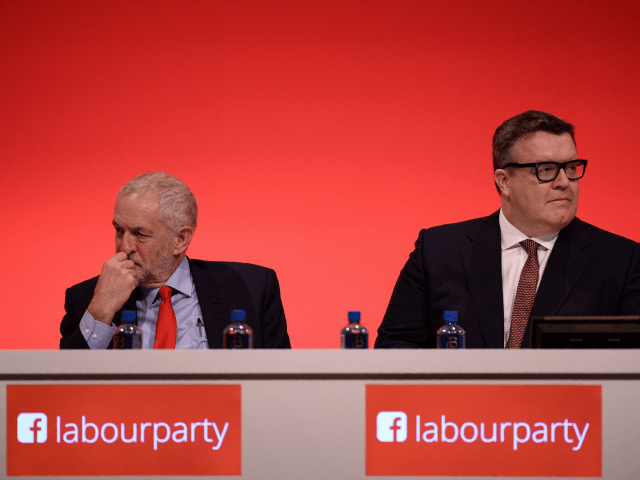(Reuters) – With the re-election of Jeremy Corbyn as leader unlikely to heal deep rifts in Labour, the only significant opposition that Prime Minister Theresa May looks likely to face as she plots Britain’s divorce from the EU is from her own party.
Britain’s exit from the bloc, or Brexit, did not even make it onto the official agenda of the Labour party’s conference in Liverpool, where MPs were more concerned with whether Labour will survive in the future.
For May, who campaigned quietly for Britain to stay in the European Union before the June referendum, it means she will be able to drive the talks without much interference from the Labour opposition.
But she may face a stronger challenge from those in her Conservative Party who are pressing for a hard Brexit, or a clean break with the EU and its single market.
Seema Malhotra, a former Labour treasury spokeswoman, told an event at the conference that she feared Labour had all but handed control to the Conservatives on Brexit.
“We have to insert ourselves into that debate because otherwise it runs the risk now of becoming another blue on blue debate, with ‘leave means leave’ and others who are Eurosceptic driving Theresa May to the right,” she told a conference event, referring to the colour that represents the Conservatives.
She said Labour must try to keep “the best of what we have in the European Union, not just because it’s good for Britain, but because it’s good for Europe and it’s good for the world as well”.
LABOUR BREXIT STANCE
Other MPs said Labour had spent little time formulating a Brexit stance, not only because of the leadership election, but because it was still unclear what it would mean, with May giving little away.
Even some in the Conservatives say Brexit could foster complacency – allowing the party’s own rifts to drive Britain’s biggest shift in policy since the end of World War Two.
“The Labour Party are not providing opposition, they are not asking those questions (on Brexit),” Nicky Morgan, a former Conservative education minister, told ITV television this month.
And while supporters of Corbyn say now that the leadership contest is out of the way, the leftist leader has the political clout to campaign for Britain to have a softer landing in its negotiations, others fear it is not his priority.
Critics say that the split between the left and centre-left in Labour offers little hope of getting the party back on track.
FEARS IN CURRENCY MARKETS
Three months after Britain’s vote to leave the European Union, fears in currency markets of a “Hard Brexit” that are expected to drive banks from London have knocked sterling to near its weakest levels in decades.
Foreign Secretary Boris Johnson spurred sales of sterling last Thursday by saying it was likely London could early next year invoke Article 50 of the EU’s Lisbon Treaty, which gives the sides two years to reach a deal.
May has yet to make her position clear, saying only that the formal divorce notification will not be invoked before the end of the year and that Britain will not get a bad deal.
Corbyn, accused of half-hearted campaigning for the remain camp, called for unity when he was elected for the second time as Labour leader at the weekend, hoping to overcome deep division between the party’s left and centre-left.
DIVISIONS IN LABOUR
Divisions in Labour are nothing new and the groundswell for change that brought Corbyn to power is mirrored across Europe, where centre-left parties lost support to anti-establishment movements since the 2008 economic crisis.
But the rift has rarely been so pronounced, and for centre-left MPs the victory by Corbyn with his left-wing agenda mean the business-friendly centre ground that handed them power in 1997 under Tony Blair has been ceded to the Conservatives.
“I just wish the party would take half a step back and realise that if the public are running in this direction, the last thing the Labour Party should be doing is running at speed in the other direction because that’s not going … to win us the country,” said Ian Murray, the only Labour lawmaker to represent a Scottish seat in parliament since the party was crushed by the nationalist SNP in 2015.
A survey by ComRes before Corbyn’s win suggested 65 percent of Britons think the Conservatives under May are more likely to win the next election. With 16 percent saying Labour under Corbyn was likely to win, many in the party see the outlook as bleak.
MAINSTREAM CONCERNED
But with a convincing leadership victory and much of the party’s machinery in the hands of his supporters, Corbyn is able to set policy with renewed confidence. Those MPs who do not see eye-to-eye with him say they will have to play ball.
Calling the leadership election result “fantastic”, James Schneider of pro-Corbyn campaign group Momentum said only when Labour has been unified has “the government been in retreat”.
But while centrist MPs say they are on board, the scars run deep – with many deeply frustrated that their bid to oust Corbyn failed so dramatically, with challenger Owen Smith winning only 38 percent of the leadership vote.
“I don’t think there’s a short-term political solution,” Tristram Hunt, a former education spokesman for Labour, told Reuters.
“Then I think we take a step back, we do the hard work, which we haven’t really done, of intellectual renewal and it’s a 10-year process. I am still up for the fight … but I think some people will bow out.”

COMMENTS
Please let us know if you're having issues with commenting.